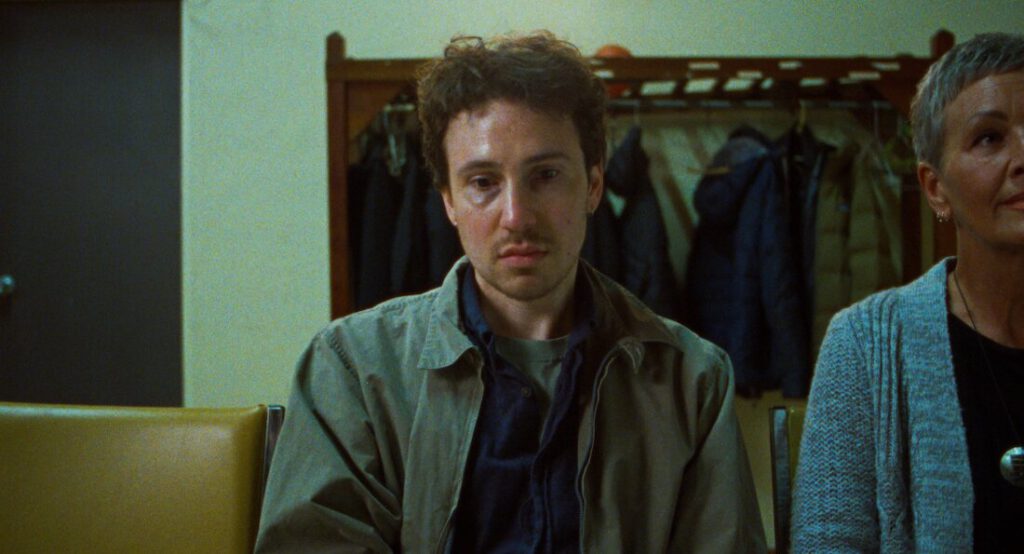Phillip Thomas’ “Cake Day” is a universal story that’s not rooted in any specific time or place, but I imagine it’s happening in real-life now more than ever. As many people know, sobriety is its own struggle. Pile on any one of the contributing factors from our world today and the struggle doubles, if not more. We can be optimistic about the coming year (I’m very, very cautiously optimistic myself). But for many, time is not marked by the changing of the calendar, but by when you get your next sobriety chip. And when a relapse happens, time starts over.
“Cake Day” tells the story of Cameron (Cameron Crosby), who is about to get his five-years-of-sobriety celebratory cake and chip at his Narcotics Anonymous meeting. When we first see him, he looks severely hungover and drained of any life force. He somehow is able to drive himself to his meeting where his sponsor, mother, and several other NA addicts await his arrival. As his moment approaches, we hear others give their stories of addiction and struggle. During this time, Cameron has to make a choice about whether or not to tell the truth about his relapse the night before.
This short film is a snapshot of an addict’s life, beautifully shot in 16mm by Liam Mitchell and given a haunting score by Jeremy Wallace Maclean. It’s the kind of short that could also work as a feature, but writer/director Thomas knows all the key moments to depict to help it work at only 15 minutes. Cameron’s struggle is internal, as he puts on a positive front to everyone around him. His sponsor doesn’t show signs of suspicion, but one gets the feeling he has seen the struggle many, many times throughout his time with NA. These performances are strong enough to convey what an addict’s state of mind is like and Thomas, who also edited the movie, puts it in sharp focus during a key sequence that quickly cuts back and forth between Cameron’s brave front and the isolation he feels, physically and internally.
It may not be the most uplifting subject matter, but if you have someone like Cameron in your life, “Cake Day” serves as an important reminder to keep that person in your prayers and check in on them. Yes, it’s finally 2021, but some people need more than a new year right now.

Q&A with writer/director Phillip Thomas
How did this come about?
Originally, the idea of developing a film set in the addiction and recovery world was brought to me by an acquaintance. It’s material that has been tread and retread for years, but his perspective was unique and very authentic. So we tackled the feature script over several months, but when it was finished and I was working through development my co-writer and I had some creative differences that put the project on ice for a year or so.
In hindsight, this ended up being a gift in strange wrapping, because it allowed me time to really process what I had learned about addiction and recovery and how to best execute putting it all on screen. After some consideration, I felt it was a good idea to do a short film about a singular moment. But the challenge of putting recovery on screen is that the drama is predominantly internal, which can be difficult to translate, especially if the viewer has no experience personally with the subject matter.
I really wanted to challenge myself with giving the audience that first-person experience—a moment where they could feel the psychological stress and pressure of recovery. To bridge the gap, it had to be based on a universal moral dilemma like honesty. Everyone, at some point, has struggled with being honest, so that felt like the perfect bridge. To heighten the stakes I felt it was best to set it at a cake day celebration which carries a natural pressure. Everyone is celebrating and praising you for an amazing achievement, but what if that was directly after a relapse? The inner torment and shame translated to screen is practically a horror film.
I brought the loose concept to my friend Cameron Crosby, who is an extremely talented actor. He loved the concept and wanted to do it, but was soon taking off to New York for a six-month stint … which actually served as great motivation for me to get it going; it lit a very hot fire under my ass. I had to hustle to write it, but once things were in motion it really came together quite quickly.
What went into the choice of shooting it on film? It looks great, by the way.
Thank you! It was a fairly quick choice. My instinct was to capture it on 16mm because it brought a real-life, gritty aesthetic almost like a documentary, which I felt added to the authenticity of the story. A timeless issue deserved to be shared on a timeless medium.
When writing it, was there ever a question as to how it would end? Did you have other ideas about what Cameron would do?
I never wavered on how to end the film. It had to be this way!
Have other addicts seen the film? What has the response been like?
I’m actually not an addict or in recovery myself, but a lot of people now believe I am, which I wear as a badge of pride. I set out to relay an experience that does not belong to me, so for anyone to believe it was authentic to the point that I had to have personal experience … I mean, that’s the greatest feedback I could ever receive. My biggest fear was to inaccurately portray such sensitive material. So I’m really happy that it’s getting such a warm reception from those in the community.

What were some of the production challenges you faced?
Oh man, we had a three-day shoot and our first day was a doozy. The location where we shot the NA meeting and bathroom scene was only available for one day because it’s used for actual NA meetings.
We had 46 set-ups scheduled for the day which was daunting to the point that it was actually funny. It felt like such a bad idea because we had to keep an insane pace. We had 15 minutes to set-up, shoot, and move to the next set-up … all day. I had to edit the movie before we shot it because there was zero wiggle room for error.
Plus, I could only afford my 35 background actors to be on set for like 3 hours. So we had to strategically place the paid background actors in the furthest seats and design all the shots to slowly move to the front of the room as the day progressed. So I sat all the friends and family in the front few rows of the meeting because they generously donated their time for the entire day.
I feel like we all lived a few days in 16 hours. I have to give a massive thank you and shout out to Cameron and my entire cast and crew for being so incredibly precise and sharp all day. It would not have been possible without their expertise and professionalism.
It’s funny though, I don’t think the movie would be better if we had more time. Having those boundaries really forces you to think deeply about what each moment means and the best way to deliver it to the audience. That day taught me what it really means to be a director so I remember it quite fondly. I’ve never had more fun or been more in the zone.
What’s next for you?
First and foremost we are going full steam ahead on an Oscar campaign for “Cake Day,” trying to get as many eyes on it as possible. So we’ll see how this whole adventure shakes out; it’s been really cool so far. You really never know how these things will go, but I’m just happy people are watching and enjoying the film.
As far as projects … I’ve got my heart set on shooting a feature film next. With several scripts ready to go, and more in development, I’m happy to see what pulls into the lead as things develop further.












